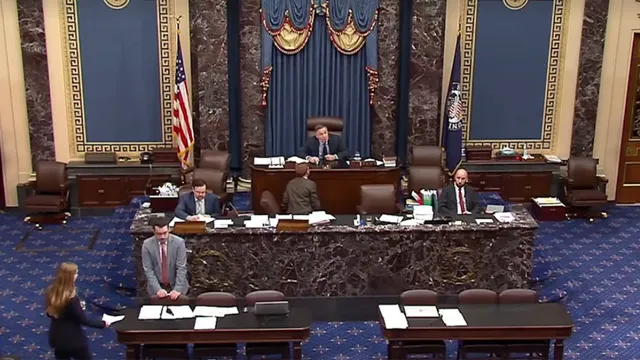
Protester arrested for disrupting Senate debate on Trump's megabill
2025-06-30 08:55- A man named Allen D. Rogers shouted criticisms during a Senate debate, expressing discontent with lawmakers.
- Rogers refused to stop his disruptions and was subsequently arrested by Capitol Police for unlawful conduct.
- The incident highlights ongoing tensions surrounding Trump's controversial spending bill and public sentiment towards legislative actions.
Express your sentiment!
Insights
On a Sunday evening in the United States, a significant disruption occurred in the Senate during a debate over President Donald Trump's proposed spending bill, famously dubbed the 'big, beautiful bill.' The event unfolded around 7:00 p.m. as Allen D. Rogers from Florida interrupted the sessions by shouting criticisms at the lawmakers from the Senate Galleries. This disruption marked a point of increasing tension surrounding the legislation that includes tax cuts, revised military budgets, and new Medicaid requirements, which Trump aims to push through the Senate. As Rogers began his vocal opposition, he was heard shouting phrases such as 'you people are awful' and 'you're horrible,' directing his ire primarily towards Republican politicians. The uproar happened directly after Independent Senator Bernie Sanders concluded his critical remarks against the bill, which Sanders referred to as 'probably the worst piece of legislation in modern history.' The bills' detractors argue it disproportionately benefits the wealthy, especially billionaires, while undermining support for vulnerable populations. This stark contrast in viewpoints contributed to the urgency and emotional volatility evident in the Senate chambers. In the midst of the chaos, presiding officer Senator Dave McCormick attempted to maintain order, repeatedly calling for the Sergeant at Arms to 'restore order in the gallery.' However, the torrent of criticism from Rogers continued until Capitol Police intervened, ultimately arresting him for unlawful conduct after he refused to comply with requests to cease his disruptions. This arrest reflects the growing frustration and volatility in American political discourse, especially as citizens exercise their right to protest. The hefty legislative proposal being debated had progressed narrowly through a previous vote, moving towards its advancement despite opposition from some Republican members. Senate Minority Leader Chuck Schumer signaled the growing tension by asserting that Democrats would demand a full reading of the large bill to ensure transparency, given widespread allegations around its contents being withheld from the public. Rogers' actions serve as a microcosm of the prevailing sentiments related to this pivotal and controversial legislative effort proposed by the Trump administration.
Contexts
The impact of Trump's megabill on American society has been significant and multifaceted. Enacted as a centerpiece of Trump's administration, the megabill aimed to jumpstart economic growth, promote job creation, and enhance infrastructure across the nation. It encompassed various initiatives, including tax cuts, deregulation efforts, and substantial investments in public works. Supporters argue that the megabill has played a crucial role in revitalizing the economy, lowering unemployment rates, and increasing consumer confidence. By reducing corporate tax rates, businesses have been incentivized to reinvest and expand, leading to job opportunities that have positively affected the daily lives of millions of Americans. Additionally, the infrastructure projects funded by the megabill are said to have created immediate employment opportunities while laying the groundwork for long-term economic stability and growth. However, the megabill has also faced criticism for its potential repercussions on the budget deficit and social services. Opponents argue that the focus on tax cuts disproportionately benefits wealthy individuals and corporations, thereby exacerbating economic inequality. Additionally, the substantial increase in national debt raises concerns about the fiscal responsibility of such large-scale spending. Critics have voiced worries that funding developed through the megabill might come at the expense of essential social programs, which are crucial for vulnerable populations, including low-income families and the marginalized. The trade-offs have sparked widespread debates about the long-term viability of the policies set in place under the megabill. The social implications of the megabill extend beyond the economic sphere. Its promotion of deregulation has led to concerns about environmental protections and workers' rights. Many environmental advocates assert that the removal of key regulations can lead to long-term damage to public health and ecosystems. The rollback of labor protections is another topic of concern, as the megabill might create a landscape where workers face reduced safety standards and diminished bargaining power. These shifts have sparked grassroots movements advocating for a return to stricter regulations, highlighting a growing divide in public opinion about the balance between economic growth and social responsibility. In conclusion, the megabill has provoked a complex interplay of economic benefits and social challenges within the American society of the 2020s. Its proponents herald the economic growth and job creation it has spurred, while its opponents caution against rising inequality, environmental degradation, and potential threats to social welfare programs. As debates continue and outcomes unfold, the true legacy of Trump's megabill will likely hinge on its long-term effects on American society, the economy, and the social fabric that binds communities together.